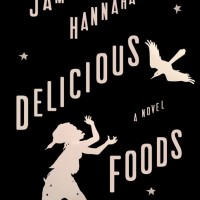‘Delicious Foods’ by James Hannaham

Author: Ken Harvey
April 12, 2015
I suppose it would be better if I didn’t review James Hannaham’s searing and beautiful Delicious Foods (Little Brown) until I’ve found some distance between the novel and me. After all, doesn’t criticism require detachment to look at things clearly? Isn’t that how we get under the hood and really see what an author is up to? Perhaps it is. But I fear that if I wait until I can be more objective, I’ll miss my deadline by at least six or seven months, if not longer. It’s this simple: I haven’t read a more affecting novel in years.
Delicious Foods is Hannaham’s long awaited follow-up to God Says No (a Gay General Fiction Lambda Literary Award finalist, 2009), a wonderfully spirited story about Gary, a young closeted gay man in the South. At the center of Delicious Foods is another young man—this time, Eddie, the son of Darlene. His father, a community organizer, is killed in a deliberate act of anti-Black violence. Darlene, who is deeply in love with her husband, does what she can to provide for her son. One day, she is enticed by promises of exceptional accommodations and a higher salary into a job at Delicious Foods. She boards a bus with other prospective workers and travels to a farm whose location is a mystery. It is here where many of the most stirring scenes in the novel take place. Delicious Foods turns out to be more plantation than farm, a place where its workers are lured into crack cocaine addiction and enslaved in brutal conditions. When Eddie is ordered to torture his mother for a minor infraction, we’re told: “In the world of Delicious Foods, though, obedience came first; everyone had to submit to a preposterous system of laws that had nothing to do with justice, logic, or even maximizing company profits—it seems as if they made up the rules just so they could enforce them and their employees would have to follow them, a pure sadism free of any incentive aside from its own continuation.” It’s hard not to think of today’s U.S. justice system as a whole—specifically as experienced by African-Americans—while reading these words.
Delicious Foods is told from multiple points of view, including the very crack cocaine upon which Darlene is chemically dependent. Scotty, as the drug is named, has become such a part of Darlene’s psyche that he becomes capable of telling her side of the story. One of the many treasures of Hannaham’s book is this wisecracking character (“When I’m the voice of reason, you know shit is fucked”) who manages to entertain while speaking difficult, sometimes unbearable truths. Scotty’s voice is alluring, funny, cynical, and not without its own cadence and language. His creation is a remarkable literary achievement.
Delicious Foods is told from multiple points of view, including the very crack cocaine upon which Darlene is chemically dependent. Scotty, as the drug is named, has become such a part of Darlene’s psyche that he becomes capable of telling her side of the story. One of the many treasures of Hannaham’s book is this wisecracking character (“When I’m the voice of reason, you know shit is fucked”) who manages to entertain while speaking difficult, sometimes unbearable truths. Scotty’s voice is alluring, funny, cynical, and not without its own cadence and language. His creation is a remarkable literary achievement.
Hannaham is as adept at conveying raw emotion as he is depicting his characters’ restraint. I’ll not soon forget Darlene’s reaction when she learns of her husband’s death: “After a few moments she collapsed into her own arms, fell to her knees beside the table, and, following an uncomfortable pause, ran outside to the clothesline, where she dashed between the ropes, yanking laundry down and hollering something that did not sound like language.” In the prologue, when Eddie presents himself to his Aunt Bethella without his hands (we first meet Eddie after his hands have been removed), his aunt reacts with visceral horror while Eddie projects resignation, thinking, “Everybody black knows how to react to a tragedy. Just bring up a wheelbarrow full of the Same Old Anger, dump it all over the Usual Frustration, and water it with Somebody Oughtas.”
It would be tempting to discuss the many writers Hannaham’s novel evokes. There’s a little Flannery O’Connor in the very idea of Eddie looking for manual labor (his business card reads “handyman without hands”). There’s some William Faulkner in Hannaham’s use of language. And there’s some Toni Morrison in his depiction of the physical and psychological effects of slavery. But to describe Hannaham’s novel by referencing other writers would be too easy, and perhaps unfair. With Delicious Foods, James Hannaham has himself become a reference point.
Delicious Foods
By James Hannaham
Little, Brown and Company
Hardcover, 9780316284943, 384 pp.
March 2015

